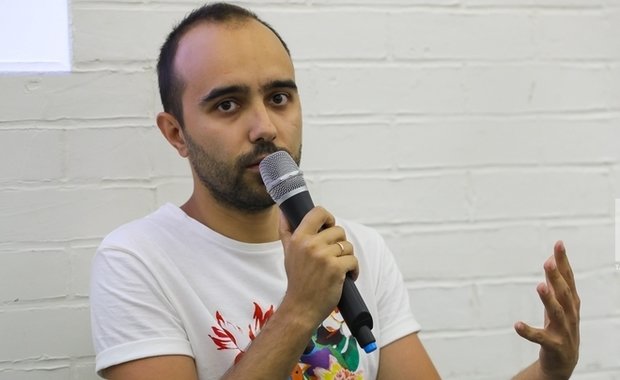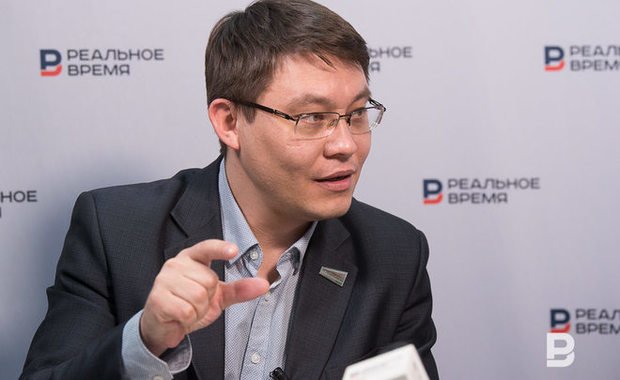Teachers to be taught to love theatre by… points
A new project called Pedagogical Laboratory was going to kick off in the Kamal Tatar State Academy Theatre on 21 February. It was born in the bowels of the theatre and enjoys the support of the Kazan Federal University. The goal is to establish a dialogue of the theatre and educational structures. The project that will bring good moral dividends as time goes by doesn't need any money. Realnoe Vremya tells the details.
''Thinking of future spectators''
''At one point we understood we didn't talk enough with educational structures. The simple example is that schoolchildren enter the hall and make noise during a play. Teachers didn't explain to them how to behave in a theatre. They didn't explain how to try to analyse what they have seen after watching a play, derive some benefit from it because the very teachers often don't have this knowledge,'' deputy marketing and PR director of the theatre Ilshat Latypov told Realnoe Vremya.
Meanwhile, apart from plays for kids, the Kamal theatre's repertoire has stagings that middle and senior graders should watch. Many of the authors, for instance, Molière, Shakespeare or Ayaz Gilyazov are in the school programme. In other words, schoolchildren can and should be among active spectators. So the educational project for teachers appeared from the plan for work with spectators.
Head of the Learning Methodology and Education of the Faculty of Psychology and Education of the Kazan Federal University Anvar Khuziakhmetov backed the theatre's initiative. ''We've been in touch for a long time with him. Khuziakhmetov is a person who is concerned about the mission of Tatar theatre, the Tatar language, our culture. The idea of our laboratory was announced in January and started to be fulfilled very quickly. We studied similar projects, for instance, the work experience with schools in the Big Drama Theatre named after Tovstonogov. They've been doing such a job for a long time. And we decided to start working in a similar format. We sent letters to the education minister, heads of regions,'' Ilshat Latypov tells.

As a result, teachers gave a reply actively. And the international seminar ''Professional Preparation of Teachers by Means of Theatre Pedagogics'', which was going to take place during the laboratory on 21 February, was to move from the Kamal theatre's Small Hall to the Big Hall because there might be a lack of seats. The seminar's organisers see that its main goal is to help teachers to become more competent in theatre, to interest them with theatre.
''We will go to passive schools''
Director of the Kamal theatre Ilfir Yakupov told Realnoe Vremya that the laboratory would gather once a month. The biggest number of speakers from both the theatre and educational system has already been chosen. By the way, not only residents of Tatarstan but also the head of a university department in Havana and a Master's degree student from Indonesia were among the participants of yesterday's seminar.
''We want to not only express our ideas and wishes but also hear the side we invite, to know what cooperation ideas they have. In other words, a dialogue is important for us. We've been having such a way of work for a long time: our actors go to schools and meet guys. But not all directors are glad to see us. We hear sometimes that children are busy, they should think of studies, not go to creative meetings. There is a misunderstanding. The second problem is the content of these meetings: as a rule, an actor tells about himself. It's good, but it's not what we'd like to have. We need to teach to understand a play, to teach to share impressions,'' Ilfir Yakupov tells.
The Kamal theatre has School of Theatre Blogger, there is an online shop where one can download books about Tatar theatre. But, unfortunately, this information doesn't reach schools. If a school director or some of the teachers like theatre, they will infect schoolchildren with this ''theatre virus''. If not, it won't happen. The theatre hopes active theatre lovers will push their passive colleagues a bit during the lessons in the laboratory.

''We want to tell why classic is important, why a play was staged 30 years ago in a different way, while now it's done in another way. Now the schoolchildren surf the Internet, they have a fragmented thinking, they find it difficult to remain in the theatre for an hour. In this respect, the laboratory has a strategic meaning, we're laying the foundation of the future occupation of the hall. A teacher who loves theatre guides his pupils, takes them to the theatre, prepares them for watching a play and then discusses what they saw. In other words, he prepares future spectators. What if there will be many of such teachers?'' says Yakupov.
By the way, the attendance of the laboratory will also bring teachers a financial benefit. After graduation, they will get a certificate whose presence gives additional points while calculating a salary. The lessons will take place not only in the Kamal theatre but at schools, particularly at more passive schools whose pupils rarely go to the theatre, so it will stir them up.
The new project of the Kamal theatre, which will be really beneficial for the theatre concerning a rise in the number of spectators later, almost needs money: ''We make do with our internal resources,'' Yakupov emphasises.